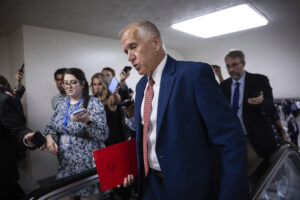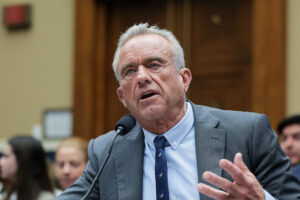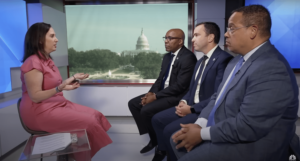Congress
Ruby-red Florida is still preparing for a financial storm from DC
TALLAHASSEE, Florida — In this hurricane-prone state, Republican legislators say they are preparing to weather a political and financial storm.
In other states led by Democrats, the moves by lawmakers could be labeled “Trump proofing.” But no matter the framing, Florida’s GOP-controlled Legislature is about to wrap up work on the state’s budget with a series of significant steps designed to shore up reserves and curtail spending.
The rationale given by Republican leaders includes everything from making the state’s budget resistant to a possible recession (without mentioning the economic impact of tariffs imposed by President Donald Trump) to acknowledging “uncertainty” associated with Congress and potential cuts to Medicaid, food aid and federal agencies responsible for helping with emergency efforts.
“Should we have the expectation that if the federal government is spending less to get their budget and debt under control that we should be held harmless? I don’t think it works that way,” said Senate President Ben Albritton (R-Wauchula.) “The question is: ‘Do I believe this budget prepares Florida for what could be coming out of the ‘DOGE’ cuts or just the changes that come out of Washington D.C.?’ And I would say yes.”
Lawmakers in Tallahassee got to this point following a protracted and bumpy session, during which legislative leaders clashed over spending levels and tax cuts. State House Speaker Daniel Perez (R-Miami) initially wanted to permanently lower Florida’s sales tax rate, but he encountered headwinds from Senate Republicans as well as Gov. Ron DeSantis. DeSantis contended the sales tax rate cut would benefit tourists and would undercut his push to cut local property taxes.
After being unable to come to a deal during their normal 60-day session, legislative leaders reached an accord late last week. The final deal calls for $2.25 billion in “revenue reductions,” but part of that total includes steering extra money into state reserves while also dedicating money to paying down existing debt. The Legislature also intends to pass a proposed constitutional amendment that would ask voters to permanently increase the size of reserves.
Perez said his push was less about tax cuts and more about paring back spending he asserts had gotten out of control during DeSantis’ time as governor.
But he also argued it would give Florida extra money that could be tapped into if another recession happens. During the Great Recession of the late 2000s, Florida Republican legislators resorted to large budget cuts, but they also drew down reserves and voted to raise taxes and fees to make up the difference
“None of us know what the future holds,” said Perez. “When we had a recession, the state of Florida was not prepared for that recession. We began to scramble. … We did not have the money that was necessary to protect Floridians. After this bill passes we will be in a better place.”
Florida currently has billions in reserves, including a mandated “Budget Stabilization Fund.” They were able to reach that point because the state’s economy grew in the aftermath of the Covid epidemic, while Florida was also flush with billions that came from Congress as part of massive aid packages.
Lawmakers are still tinkering with the current budget, but they are expected to land on a final total this month that puts overall state spending below the amount spent during the current fiscal year that ends on June 30.
The Legislature is also taking steps to claw back billions in unspent money. On Thursday, lawmakers sent DeSantis a bill that would free up $2.1 billion that Florida had set aside three years ago to assist private insurance companies struggling with backup financing due to the state’s property insurance crisis. The money would have eventually reverted back to the state’s main budget account, but legislators decided to speed that up.
As the session has gone on, top Republicans have initially side stepped questions about how much federal grant money state universities lost due to cuts pushed by Elon Musk and the Department of Government Efficiency efforts. Likewise, there has been little debate or discussion about potential impacts to other programs that are heavily reliant on federal aid such as Medicaid.
Florida is also still waiting on money it previously requested from the Federal Emergency Management Agency in response to a flurry of hurricanes that have ripped through the state in recent years.
“There may not be a FEMA next year, none of us know that,” state Senate budget chief Ed Hooper (R-Palm Harbor) said while defending the legislative proposal to set aside extra money for the reserves.
Under the current plan legislators will set aside $1.5 billion over the next two years that will eventually roll into the “Budget Stabilization Fund” if voters ago along with the idea of increasing the size of that reserve.
Some Democrats — who contend the state already doesn’t spend enough on teachers, health care and other programs — raised questions this week about the efforts to put money away in a “lock box,” questioning how easily the Legislature could tap into the fund. The proposal going before voters says the state could withdraw money fund for a “critical state need,” even though that term isn’t defined.
“It’s important to have flexibility because you never know what will come your way,” said state Rep. Christine Hunschofsky (D-Parkland).
But Republican legislators backing the idea said they wanted to make sure the money was only used to deal with a financial crisis or emergency for the state.
“We are doing this so we are truly prepared for a break-the-glass situation,” said Rep. Lawrence McClure (R-Dover), the House budget chief.
Congress
Thom Tillis denounces GOP megabill’s Medicaid cuts in fiery speech
Hours after announcing his retirement, Republican Sen. Thom Tillis went to the Senate floor and slammed the GOP’s plans for drastic Medicaid cuts — warning Republicans they are about to “make a mistake on health care and betray a promise” if their sprawling domestic policy bill passes.
“It is inescapable this bill will betray the promise Donald Trump made,” Tillis said. “I’m telling the president that you have been misinformed. You supporting the Senate mark will hurt people who are eligible and qualified for Medicaid.”
Tillis, who opposed the bill on a procedural vote Saturday night and then announced Sunday he would not seek reelection, said he could not vote for the Senate’s bill because of provisions that he said would kick some 663,000 residents of his state off their health care plans. He called on the Senate GOP to jettison its “artificial” July 4 deadline and rewrite the bill.
“I respect President Trump, I support the majority of his agenda, but I don’t bow to anybody when the people of North Carolina are at risk, and this puts them at risk,” Tillis told reporters after he left the floor.
The two-term senator who has been known for working across the aisle said he had done his own research on how changes to so-called state directed payments and a new cap on medical providers taxes would affect his state — contacting state legislative leaders, the state’s Democratic governor, Josh Stein and hospital groups.
Tillis said he also talked to CMS Director Mehmet Oz and presented his findings that showed the best-case scenario was a $26 billion cut in federal support.
“After three different attempts for them to discredit our estimates, the day before yesterday they admitted that we were right,” Tillis said on the floor. “They can’t find a hole in my estimate.”
In his remarks to reporters, he said Trump is “getting a lot of advice from people who have never governed and all they’ve done is written white papers,” adding that he has “people from an ivory tower driving him into a box canyon.”
Tillis, who was elected to the Senate in 2014, compared Trump’s “big, beautiful bill” to the Affordable Care Act: “The effect of this bill is to break a promise. And you know, the last time I saw a promise broken around health care, with respect to my friends on the other side of the aisle is when somebody said, ‘If you like your health care, you can keep it.’”
The Senate is now working through up to 20 hours of debate, before a marathon voting series of amendments scheduled to start Monday morning. Tillis said he might return to the floor to speak against the bill.
Trump lambasted Tillis Saturday night after he voted against opening debate on the megabill, and Tillis said he’d already told Trump at that point he was likely to retire.
“Pretty much what I said on the floor is what I said to the president last night and I stand by it,” Tillis told reporters after the speech, adding later that he told the President he “probably needed to start looking for a replacement.”
“I told him I want to help him,” Tillis added. “I hope that we get a good candidate that I can help and we can have a successful 2026.”
Congress
Rick Scott drafts key Medicaid amendment ahead of voting marathon
Florida Sen. Rick Scott is circulating text of his amendment to the GOP megabill that would effectively end a key Medicaid financing mechanism after 2030.
The provision won the backing of Senate Majority Leader John Thune during an eleventh-hour negotiating session held Friday night as a procedural vote was held open to win over Scott and other holdouts. It is expected to come up during the “vote-a-rama” set to take place overnight Sunday into Monday where dozens of amendments will be debated and voted on.
Scott said Sunday he’s “very confident that my amendment is going to pass.” Other Republicans are skeptical, with several in the GOP ranks nervous about cutting too deeply into Medicaid.
Under the amendment, the federal government’s 90 percent cost share for Medicaid enrollees made newly eligible under the 2010 Affordable Care Act will end on Dec. 31, 2030. Beneficiaries who were enrolled prior to that date would be grandfathered in at the old rate, but new enrollees would see their medical costs reimbursed at the lower “FMAP” rate, which can be as low as 50 percent, with states picking up the rest.
The amendment is co-sponsored by GOP Sens. Ron Johnson of Wisconsin, Mike Lee of Utah and Cynthia Lummis of Wyoming, as well as Finance Chair Mike Crapo of Idaho.
Congress
Republicans move forward with controversial megabill accounting move
Senate Republicans are on the cusp of formally adopting a controversial accounting tactic to zero out much of the cost of their massive domestic policy bill.
The matter came to a head on the Senate floor Sunday afternoon, when Democrats sought to prevent the use of the current policy baseline, as the tactic is known. Minority Leader Chuck Schumer objected to the maneuver and accused Republicans of setting a new precedent with the “budgetary gimmick.”
The Senate is set to vote on Schumer’s objection later Sunday or Monday, but Republicans believe their members will back up Senate Majority Leader John Thune and Senate Budget Chair Lindsey Graham.
That’s in part because they were able to sidestep a situation where senators would be asked to overrule Parliamentarian Elizabeth MacDonough on the baseline question. Instead, Republicans are asserting that Graham (R-S.C.) has the ability to establish which baseline is used under the 1974 law governing the budget process, rather than having MacDonough issue a formal ruling.
“There is nothing to debate and we consider this matter settled,” Graham spokesperson Taylor Reidy said.
The revised baseline allows Republicans to essentially write off the $3.8 trillion cost of extending tax cuts passed in 2017 that are set to expire at the end of the year. The effect on the megabill’s bottom line is profound as a pair of new Congressional Budget Office reports show.
One, released late Saturday night using the current policy baseline, showed the legislation would reduce the deficit by $508 billion. The other, released Sunday morning using the traditional method accounting for expiring provisions, showed the megabill would increase the deficit by $3.25 trillion.
“Things have never, never worked this way where one party so egregiously ignores precedent, process and the parliamentarian, and does that all in order to wipe away trillions of dollars in costs,” Sen. Patty Murray (D-Wash.) said during a speech on the Senate floor Sunday.
The maneuver came as little surprise. The GOP plan has been quietly in the works for months, and Thune had suggested they would reprise the no-formal-ruling strategy they’d used earlier in the process of passing the megabill.
“As we did on the budget resolution, we believe the law is clear that the budget committee chairman can determine the baseline we use,” Thune told reporters. Graham on Sunday embraced the CBO ruling showing the deficit savings — and his own authority to make the accounting change: “I’ve decided to use current policy when it comes to cutting taxes,” he said. “If you use current policy, they never expire.”
The baseline change is crucial for Senate Republicans because under the budget blueprint they adopted earlier this year, the Finance Committee provisions in the bill can only increase the deficit by a maximum of $1.5 trillion. The bill now under consideration wouldn’t comply under the old accounting method.
Sen. Ron Wyden (D-Ore.), the top Finance Democrat, called it “budget math as fake as Donald Trump’s tan” and said the GOP amounted to a “nuclear” choice that would weaken the chamber’s 60-vote filibuster.
“We’re now operating in a world where the filibuster applies to Democrats but not to Republicans, and that’s simply unsustainable given the triage that’ll be required whenever the Trump era finally ends,” he said.
-

 The Josh Fourrier Show8 months ago
The Josh Fourrier Show8 months agoDOOMSDAY: Trump won, now what?
-
Uncategorized8 months ago
Bob Good to step down as Freedom Caucus chair this week
-

 Politics8 months ago
Politics8 months agoWhat 7 political experts will be watching at Tuesday’s debate
-

 Politics8 months ago
Politics8 months agoHow Republicans could foil Harris’ Supreme Court plans if she’s elected
-
Economy8 months ago
Fed moves to protect weakening job market with bold rate cut
-
Economy8 months ago
It’s still the economy: What TV ads tell us about each campaign’s closing message
-

 Politics8 months ago
Politics8 months agoRFK Jr.’s bid to take himself off swing state ballots may scramble mail-in voting
-
Uncategorized8 months ago
Johnson plans to bring House GOP short-term spending measure to House floor Wednesday







